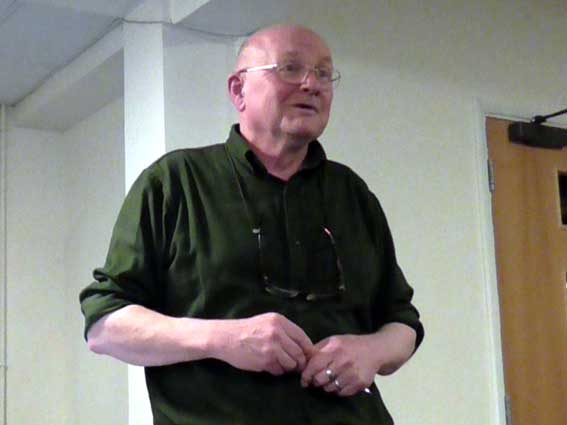Dr Richard Bradbury on William Barnes: What is the point of William Barnes in the 21st Century?
Jim Potts

Last night's talk by Dr. Richard Bradbury of the Open University, editor of the six-volume The Collected Prose of William Barnes, made a convincing case for the continuing relevance and social significance of William Barnes.
Born in Templecombe, Somerset, for many years Dr. Bradbury was apparently mocked mercilessly by his peers, speakers of RP (the increasingly dominant Received Pronunciation, or BBC English) for his West Country accent. His career has made him appreciate the 'grandeur of life in diversity', as Charles Darwin put it, and the importance of having roots, a strong sense of place and of one's origins - but if we have boundaries, they should not become barriers to keep other people out (or to insist that one way of reading a Barnes poem aloud is better or more authentic than another).
Barnes felt a sense of horror at the loss of public spaces (whether common land or allotments). Dr. Bradbury compared it to people's current fears of the loss of the Welfare State.
He made a plea for people to get back to the sort of civilized values that were expressed by William Barnes, with an emphasis on the quality of life and on what makes life worth living.
Dr. Bradbury focused on Barnes' important prose work, "Views of Labour and Gold" (1859), published in the same year as Charles Darwin's "On the Origins of Species" and Karl Marx's "A Contribution to the Critique of Political Economy".
He was particularly interested in Barnes' discussion of the differences between "real" and "commercial" value (the gap, and disparities of wealth, had been opening up dramatically at the time of writing), and of Barnes understanding of ecological issues. These aspects of his writing ensure his continuing relevance in the 21st Century, quite apart from the inherent values of his poetry.
Thinking about Dr. Bradbury's description of his uncle's very local speech (far removed from the influence of RP, as he had owned no radio) and the 'power relationships' engendered by the spread of BBC English, I was reminded of the very powerful sonnets and other brilliant and moving Leeds poems by Tony Harrison, on related social, family and linguistic issues.
William Barnes and Tony Harrison remain two of my most frequently-read poets to this day.
Like Dr. Bradbury, I share and value a strong sense of being rooted in a place, although I have also worked overseas for many years, and speak other languages. While he can get by in Polish and Spanish, I often use Greek and other European languages, to the best of my ability. Dorset-Speak and Somerset-Speak (Dr. Bradbury is wary of terms like dialect, or of attempts to preserve the 'purity' of languages) retain their particular strengths, vitality and attraction.They are vital for our 'sense of being', and we must all be aware of the consequences of "glossophagy".
Thinking of language and diversity, Dr. Bradbury quoted with approval this passage by Charles Darwin:
"It is interesting to contemplate a tangled bank, clothed with many plants of many kinds, with birds singing on the bushes, with various insects flitting about, and with worms crawling through the damp earth, and to reflect that these elaborately constructed forms, so different from each other, and dependent upon each other in so complex a manner, have all been produced by laws acting around us. These laws, taken in the largest sense, being Growth with reproduction; Inheritance which is almost implied by reproduction; Variability from the indirect and direct action of the conditions of life, and from use and disuse; a Ratio of Increase so high as to lead to a Struggle for Life, and as a consequence to Natural Selection, entailing Divergence of Character and the Extinction of less improved forms. Thus, from the war of nature, from famine and death, the most exalted object which we are capable of conceiving, namely, the production of the higher animals, directly follows. There is grandeur in this view of life, with its several powers, having been originally breathed by the Creator into a few forms or into one; and that, whilst this planet has gone circling on according to the fixed law of gravity, from so simple a beginning endless forms most beautiful and most wonderful have been, and are being evolved."
Although Dr. Bradbury said he had little in common with William Barnes, the Anglican priest, he did certainly do him full justice as a prose-writer, poet and social thinker.
Postscript:
Apparently, Darwin's " tangled bank " paragraph 'did not include the phrase "by the Creator" in the first edition of November, 1859. This phrase having been inserted, due to popular pressures for mention of divine actions, into the second edition of January, 1860 and subsequently retained'. (See http://www.age-of-the-sage.org/charles_darwins/quotes/tangled_bank.html)
More news









